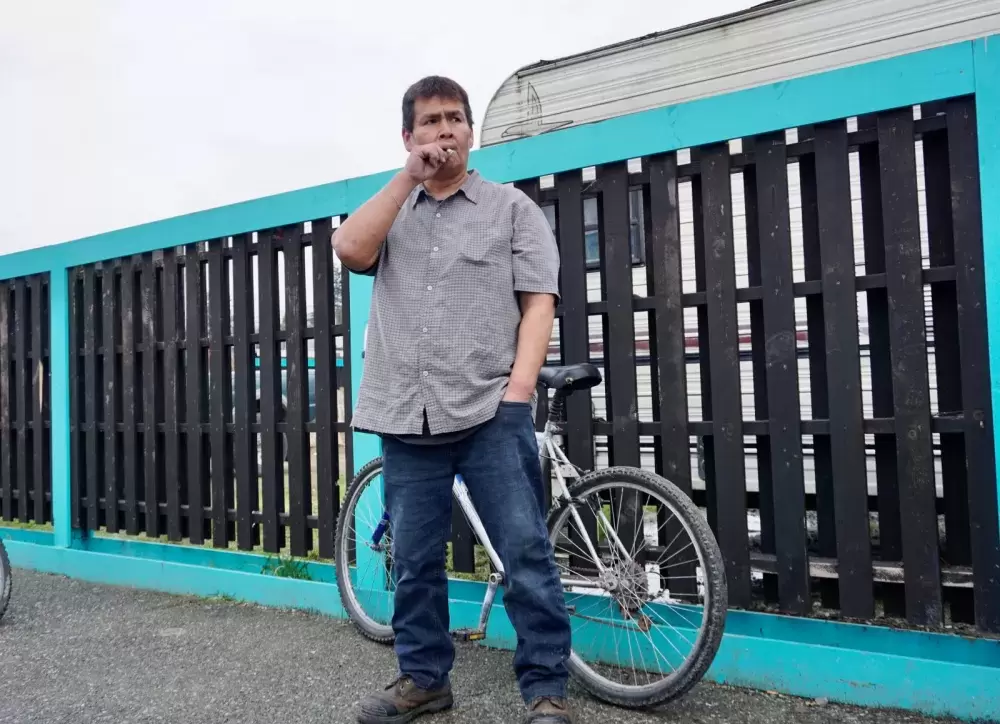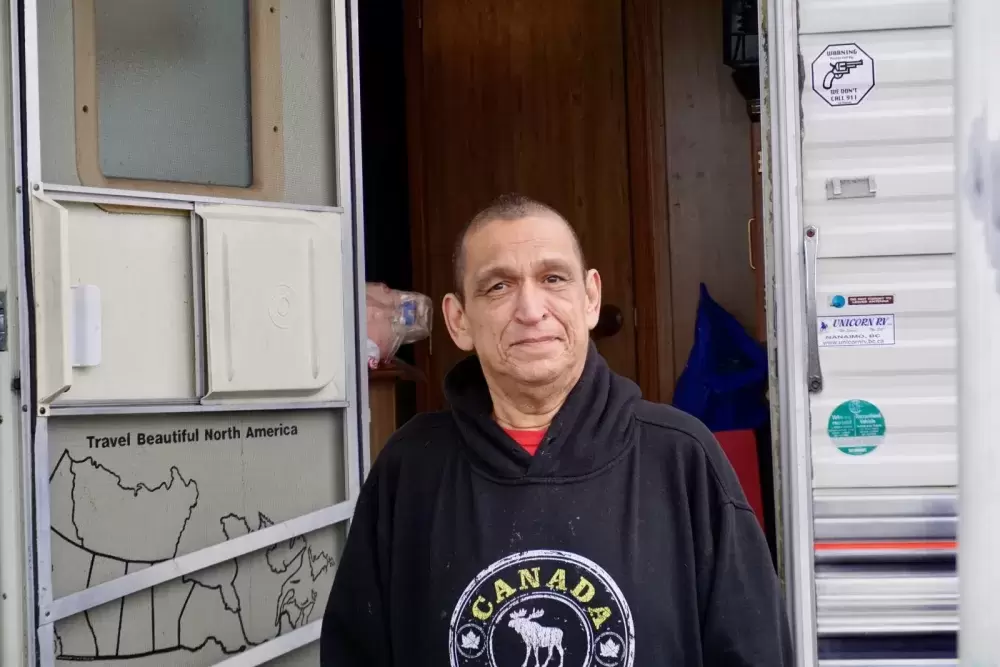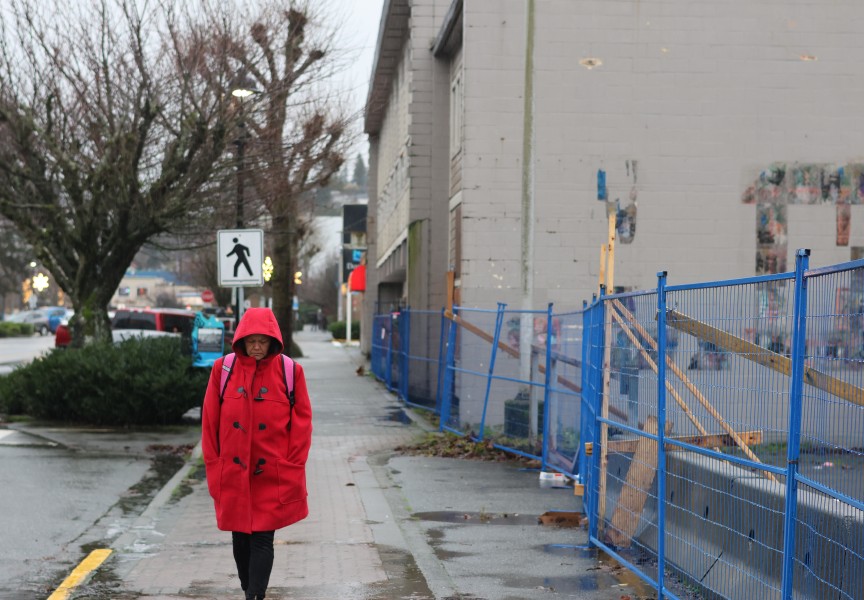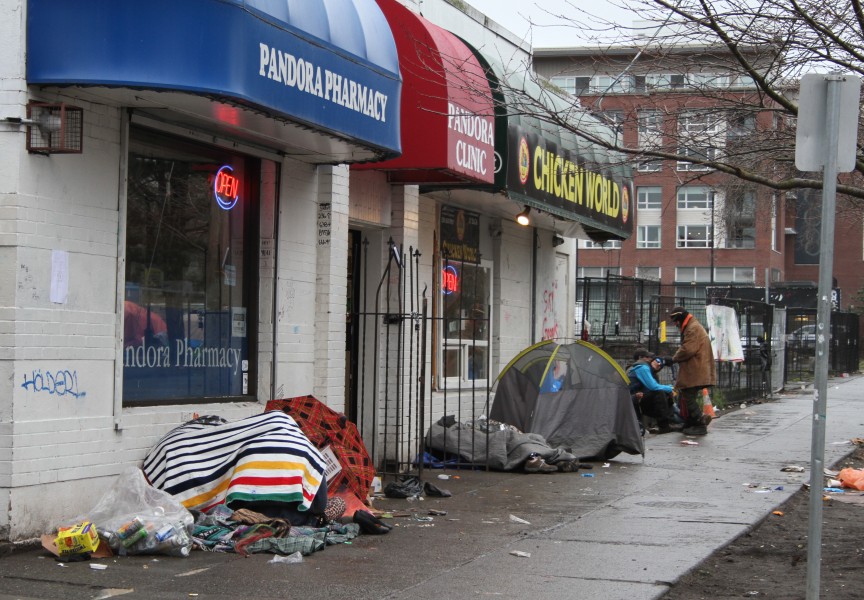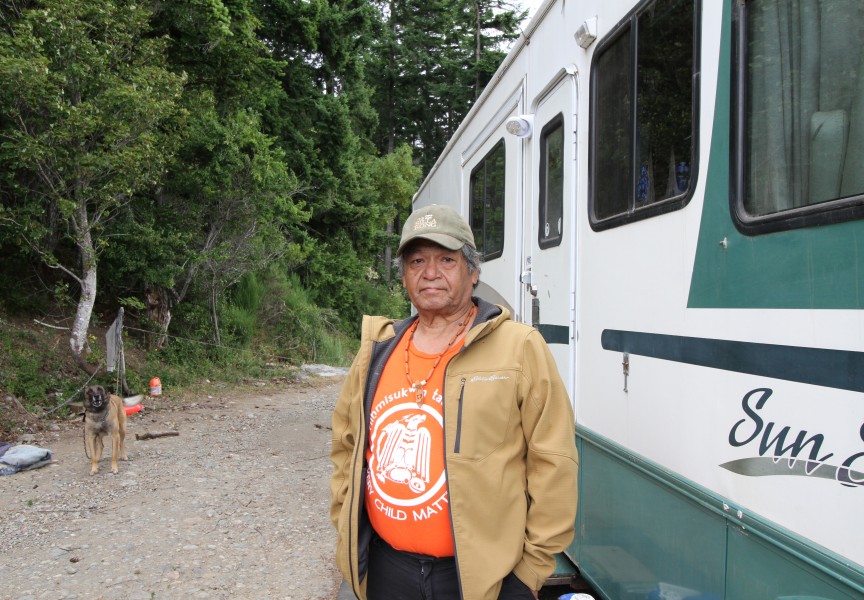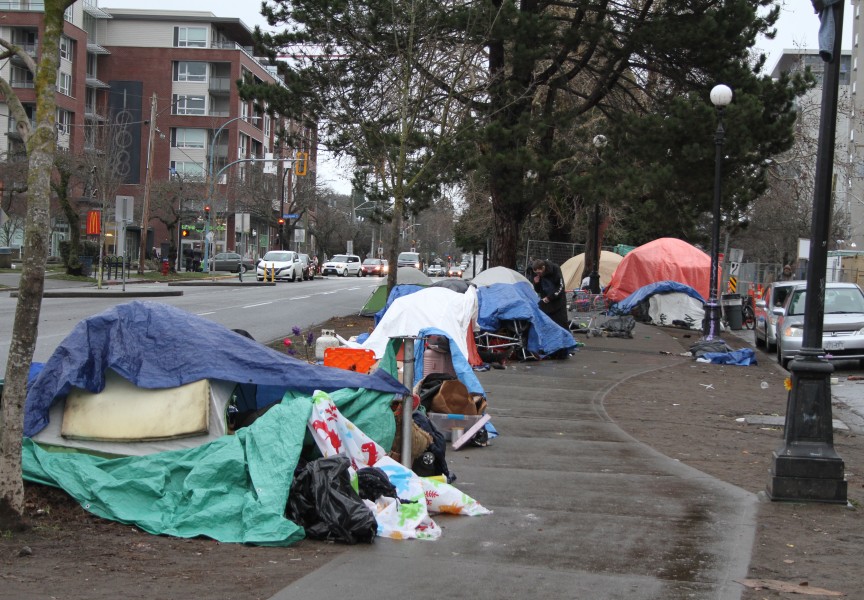Driving by Port Alberni’s Wintergreen Apartments on Fourth Avenue on any given day, you’ll most likely catch a glimpse of people coming and going from the two-storey building, stashing their shopping carts by the edge of the fence or dashing back and forth from the Overdose Prevention Site just up the road.
The apartment building, sometimes referred to as “the ghetto”, has become a focus of discussion for Port Alberni city council this winter after city bylaw services and emergency personnel have deemed many aspects of the building unsafe and in violation of several municipal bylaws.
Neighbours have also complained that the property can be an eyesore. It often has debris scattered along the building, garbage bins overflowing, mattresses and other refuse left laying around the lot next to the property that is now home to about half a dozen trailers, and counting.
In November of last year, property owner Randy Brown was given a Remedial Action Order by the City of Port Alberni and required to complete an extensive list of upgrades, including removing all trailers from the property. Brown told city council he had no plans to follow the city’s orders and won’t be removing the trailers, claiming those living there would have no where else to go.
The city gave Brown a 14-day extension to complete the required orders on Jan. 11.
A staff report set to be presented at a regular council meeting on Feb. 8 states that since the 14-day expansion, Brown has completed some of the required orders, including repairing broken windows, but there’s still many uncompleted requirements.
The report states that extension cords run from the trailers in the lot to the building causing tripping hazards and three of the trailers have the septic system connected to the property’s sewer system without inspection or permits.
In the report, staff have suggested that in absence of work being done on the part of the property owner to address the remedial action requirements, council hold an in-camera meeting to discuss the next steps.
‘It saved my life’
But what about the residents who live there? For many, the trailers are the only option of getting out of the cold and having a roof over their head.
Bear Lind has been living in a trailer on Brown’s lot for the past three months after he was kicked out of the Port Alberni Shelter (Our Home on Eighth).
“I lived [at the shelter] for about four or five months. I had an apartment up top. I was one of the regulars up top. They have no appeal process (after being kicked out) so that was the biggest issue,” Lind said, who is from the Kwagu'ł First Nation in Port Hardy.
Lind says he’s aware some people focus on the rumours or hearsay they hear about the property owner and the people who live in the trailers, but for him without this option he’d probably be living on the streets.
“Basically it saved my life,” he said. “Nobody comes and looks and sees what they’re doing and sees how it’s benefiting people. I’d absolutely be on the street if it wasn’t for the trailer. This is the first time I’ve had my own place where I haven’t had any hassle.”
Throughout his life, Lind has been an advocate for people experiencing homelessness and hopes to continue his activism in the future. He’s currently struggling with his own addiction after recently falling into a state of depression, but he hopes to continue working on himself and eventually move back to Vancouver.
“If you had a map of the worst area in Port Alberni this would be the centre,” Lind said outside the Wintergreen Apartments. “But there’s a camaraderie you don’t see anywhere else…everyone works together here.”
“There are people here who haven’t had a home for four or five years that [Brown] gave homes to,” added Lind. “He’s doing something in Port Alberni that nobody else does.”
For Robert Thomas from Tseshaht First Nation, having a trailer would help him out greatly. He’s been experiencing homelessness for the past two and a half years, sleeping at his girlfriend’s place when he can. Thomas said he’s waiting for a trailer from Brown.
“I’ve been looking for (housing) for a long time, two and a half years,” Thomas said. “They don’t want to give me nothing. I’ve looked everywhere.”
Robert said a lack of finances is a major factor in not finding stable housing. He broke his back eight years ago and hasn’t been able to work since. He’s also currently trying to get on methadone to help with his addiction problem.
Most homeless are single men
A 2018 BC Housing homeless count shows 147 people were experiencing homelessness in Port Alberni, 68 per cent of which were male.
Homelessness doesn’t discriminate against a certain gender, but some men believe it’s easier for women to find shelter because there’s more female-specific resources available.
Rhonda Ursel, housing coordinator with KUU-US, said it can be easier for women to access housing because in many cases woman have children with them and understandably are offered more support.
“I also think that woman are more likely than men to reach out for help,” Ursel said.
Ursel, who compiles a weekly housing registry, said on average around two new individuals are added to the registry per week at the moment.
“Right now I have 27 on my registry, 20 women and seven men,” she said. “But when I’ve done outreach, I would say the majority of the homeless that I have seen are single males.”
Ursel said there is a definite need for more low-income and supportive housing in Port Alberni.
“We desperately, desperately need low-barrier housing with supports in place. There are so few rentals on the market right now and so many people looking. Rents are very high and landlords are requesting references, credit checks, etc. It's making it impossible to house our homeless,” Ursel said. “And we need more low-income housing as well. I speak with a lot of families in need of that. They have told me that the wait list is one to two years or longer for low-income housing.”
Katrina Kiefer, executive director with the Canadian Mental Heath Association in Port Alberni, said in her experience, men are usually easier to house than women as they often do not have children with them.
“Single mothers are generally more difficult to house as landlords, managers and property owners may not want children in their rentals,” Kiefer said in an emailed response.
Kiefer added that there continues to be ingrained racism in the community towards all First Nations peoples, “as too many times, First Nations men and women are turned away solely for being First Nations.”
John Douglas is the community engagement and special project coordinator with the Port Alberni Shelter Society. He's heard from homeless women who are in relationships that they're often more comfortable living with their partner on the street than seeking a bed at the shelter, but that single women will be more inclined to seek housing at PASS.
“Housing is difficult and complex...for everyone...composed of many elements such as addictions, mental health and past traumas. Gender is another item on that long list,” Douglas said. “All of the facilities PASS currently operates are available to all of those in need of housing, disrespective of gender.”
Douglas said PASS hopes to eventually open a Therapeutic Recovery Community exclusively for women (there are none in Canada), which will eventually embrace all genders and families.
“We have some pending funding applications in and are awaiting decisions, have obtained letters of support from local and regional representatives and are getting private donations towards our economic plans for purchasing and moving ahead,” he said.

